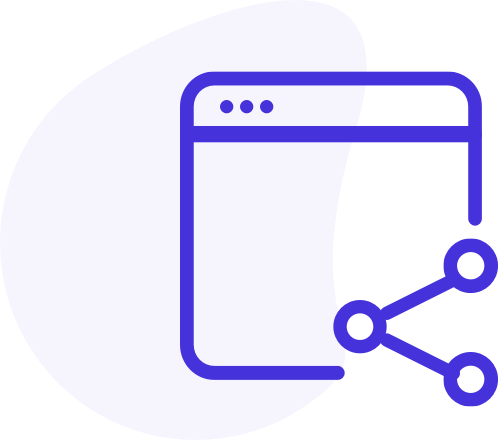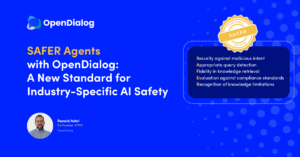OpenDialog's Complete Guide to
Conversational AI
Conversational Artificial Intelligence (AI) is a transformative technology that enables computers and machines to interact with humans in a natural and conversational manner. Don’t just take our word for it, listen to our CEO, Terry Walby explain further…
Understanding the Basics
Everything You Need To Know About Conversational AI
What is Conversational AI?
Conversational Artificial Intelligence, or conversational AI, refers to the use of AI technologies such as natural language processing (NLP), machine learning, and large language models (LLMs) to enable machines to understand, interpret, and respond to human language in a conversational manner.
What is the Difference Between Generative AI and Conversational AI?
Generative AI and conversational AI are related but not the same. Generative AI generates new content based on patterns, while conversational AI focuses on creating AI systems for interactive conversations with humans. Conversational AI involves additional technologies like natural language processing and understanding to enable meaningful interactions. So, while generative AI is part of conversational AI, they are not synonymous.
What is the Difference Between Chatbots and Conversational AI?
Although chatbots are a subset of conversational AI, there are important distinctions. Chatbots typically follow predefined rules or decision trees, while conversational AI systems leverage machine learning algorithms to learn from user interactions and generate more adaptable and contextually relevant responses. Unlike traditional chatbots, conversational AI systems can comprehend and generate human-like responses, providing a more engaging and interactive user experience.
What are AI-Powered Chatbots?
AI-powered chatbots combine the capabilities of conversational AI with the practicality of chatbot solutions. These chatbots utilize advanced AI techniques to understand user intents, context, and sentiment, enabling them to provide personalized and contextually relevant responses.
What is an Enterprise Conversational AI Platform?
An enterprise conversational AI platform is a software solution that allows businesses to deploy and manage conversational AI systems at scale. These platforms provide tools for training, customization, integration, and analytics.
What Problems Does Conversational AI Solve?
Conversational AI solves problems related to customer engagement, accessibility, operational efficiency, skills-shortages, and personalized interactions. It enables businesses to handle a high volume of customer interactions, provide instant support, and deliver tailored experiences 24/7. Many of the benefits and potential use cases can be found later in this guide.
What is an Example of conversational AI?
The OpenDialog platform is an example of an enterprise conversational AI, fit for use within regulated industries such as healthcare and insurance. The OpenDialog platform has been developed by industry-leading AI experts and enables the creation of highly sophisticated and compliant customer experiences that are quick to build, easily managed and scaled, and embrace the latest advancements in AI.

Applications of Conversational AI
Customer Support and Service
Conversational AI revolutionizes customer support by providing instant assistance and resolving queries in a conversational manner. AI-powered chatbots can handle a high volume of customer interactions, ensuring 24/7 support and reducing the need for human intervention. Conversational AI systems can also understand customer sentiment, detect frustration, and escalate complex issues to human agents when necessary.
Personalized Recommendations
Conversational AI systems can analyze user data and behavior to provide personalized recommendations and suggestions. By understanding user preferences and purchase history, businesses can offer tailored product recommendations, increasing cross-selling and upselling opportunities. For example, an insurance provider can process an enquiry, provide a quote and transact on a policy with the correct level of cover.
Advanced Virtual Agents for Business Operations
An advanced virtual assistant is an artificial intelligence-powered software program designed to interact and assist users in a conversational manner. It can perform various tasks, such as answering questions, providing information, scheduling appointments, and executing commands, all through natural language conversations.
Market Research and Surveys
Conversational AI platforms can be used to conduct market research and gather valuable insights from customers. By engaging users in interactive conversations, businesses can collect feedback, opinions, and preferences, helping them make data-driven decisions and improve their products or services.
Benefits of Conversational AI

Reduce Cost of Operations
Reduced reliance on human resources by removing up to 83% of human interactions
Automation of labour intensive manual processes
Execution of tasks at machine speed

Increase
Revenues
Improved buying journey and purchase completion rates
Enablement of effective upsell strategies to increase average order values
Creation of new products and services

Improved Customer Experience
Consistent engagement across multiple channels
Faster execution of requests with higher accuracy
Available 24/7/356 across multiple regions and languages

Enhance Brand
Loyalty
Personalized engagement
Contextual user experiences
Easy and consistent support of brand values
Get In Touch To Learn How OpenDialog Can Help Your Business Automate Up To 90% Of Interactions Through Conversational AI.
Implementing Conversational AI in Regulated Markets
Conversational AI Uses Across Regulated Industries
Conversational AI Uses in the Healthcare Industry:
- Appointment scheduling & management
- Patient onboarding automation
- Health & wellness support
- Outpatient support
- Billing & insurance query automation
- and more
Conversational AI Uses in the Insurance Sector:
- Contact center automation
- Quote-to-bind journey
- Renewals
- Claims automation
- Mid-term adjustments
- and more
See Conversational Artificial Intelligence In Action
How OpenDialog Enhances Conversational AI in Regulated Markets
OpenDialog stands out as a conversational AI platform for regulated markets, providing unique features and benefits:
Transparency of Outputs from Generative AI
Built with transparency in mind, OpenDialog specializes in building conversational AI solutions for businesses in regulated industries. OpenDialog analytics provides clear explanations for decisions, and makes the reasoning behind specific outcomes easy to understand from the perspective of every stakeholder. The platform enables regulated businesses to trace and analyze interactions with customers which aids in compliance efforts, regulatory audits, and addressing any disputes or concerns that may arise.
Ensuring Compliance and Avoiding Hallucinations
OpenDialog’s conversation engine offers businesses unparalleled control over the responses generated by the conversational AI system. It allows for granular customization, ensuring compliance with regulations and avoiding hallucinations. Businesses can tailor the AI system’s output to their specific requirements, providing accurate and reliable information to customers to maintain their integrity and mitigate risks associated with hallucinations.
Challenges and Limitations of Conversational AI
While conversational AI offers immense potential, there are challenges and limitations to consider:
Language Understanding and Natural Language Processing
Understanding and interpreting human language accurately can still be a challenge for conversational AI systems. Ambiguities, slang, and contextual nuances can affect the accuracy of responses. Ongoing advancements in natural language processing techniques are addressing these challenges, but there is still room for improvement. OpenDialog enables businesses to access the most powerful NLU engines currently in the market, combine them and adapt their use based on the required context.
Contextual Understanding and Personalization
Conversational AI systems need to accurately understand and maintain context during conversations. Personalizing responses based on user preferences, previous interactions, and current situations is crucial for delivering a seamless and engaging user experience. Achieving a high level of contextual understanding and personalization requires robust AI models and well-curated data. OpenDialog’s context-first approach to conversation design, harmonious systems integrations and diligent onboarding process ensure a best-in-class, hyper-personalized interaction between businesses and their customers.
Ethical and Legal Considerations
As conversational AI becomes more pervasive, ethical and legal considerations arise. Conversational AI systems must respect user privacy, handle sensitive data securely, and operate within the boundaries of applicable regulations. Transparency in data handling practices and clear user consent mechanisms are essential for building trust and maintaining ethical standards.
Future Trends in Conversational AI
The field of conversational AI is evolving rapidly, and several trends are shaping its future:
Advancements in Natural Language Processing
Ongoing research and development in natural language processing techniques will lead to more accurate language understanding, sentiment analysis, and context-awareness. Conversational AI systems will become more proficient in understanding and generating human-like responses, improving overall user satisfaction. OpenDialog’s architecture allows for seamless integration with future updates of language models. This ensures that businesses using OpenDialog can benefit from the latest advancements in conversational AI without disruption.
Integration with Internet of Things (IoT) Devices
Conversational AI will integrate with IoT devices, enabling users to interact with their smart homes, vehicles, and appliances using natural language commands. Voice-activated assistants will become the central control hub for managing and controlling various IoT devices, creating a seamless and intuitive user experience.
Start Your Generative AI Powered Transformation Journey Today




More to explore

Forms or Conversational AI Agents : together is better!
Conversational AI: A Supplement, Not a Replacement There’s a growing notion that forms should be replaced with Conversational AI. But is that really necessary? Forms

The future of user interfaces is hybrid
A New Paradigm: hybrid user interfaces Generative AI Agents and the use of Large Language Models are all the hype. On the one hand, stakeholders

SAFER Agents with OpenDialog: A New Standard for Industry-Specific AI Safety
Introduction Deploying conversational AI systems in regulated environments such as healthcare, finance, and insurance presents unique challenges that generic AI solutions cannot address. At OpenDialog,

